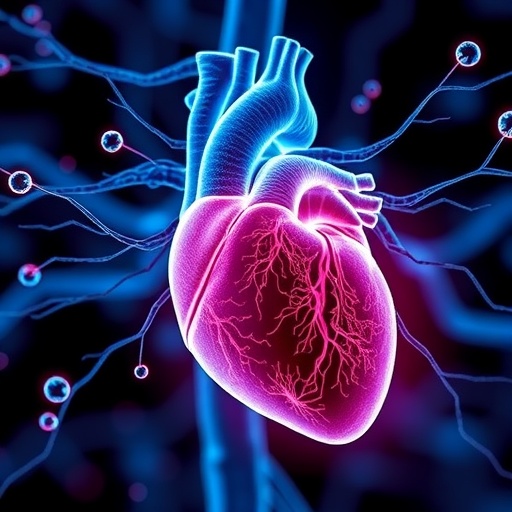In a significant development within the biomedical research community, the article titled “Role of dopamine D2 receptors in ischemia/reperfusion induced apoptosis of cultured neonatal rat cardiomyocytes” has been formally retracted. The publication, which appeared in the Journal of Biomedical Science, highlighted a crucial aspect of cardiovascular research, specifically focusing on the implications of dopamine D2 receptors in the context of cell death caused by ischemic events. This retraction is emblematic of the ongoing scrutiny and rigorous standards required in scientific publishing, shedding light on the necessity for transparency and integrity in research outcomes.
The study initially sought to explore the biochemical pathways that govern apoptosis—the process of programmed cell death—in neonatal rat cardiomyocytes subjected to ischemia/reperfusion injury. This phenomenon, wherein blood supply returns to the tissue after a period of ischemia, is known to trigger a cascade of cellular responses that can lead to significant damage and cell death. The researchers were focusing on the role of dopamine, a neurotransmitter with various physiological roles, and its specific D2 receptors, which are known to influence cardiac function.
Dopamine has long been recognized for its implications in the central nervous system, but its cardiovascular effects have recently garnered more attention. The hypothesis underpinning the study was that the activation of dopamine D2 receptors could offer protective effects against ischemia/reperfusion injury in cardiomyocytes. This insight could potentially open new therapeutic avenues in treating ischemic heart disease, a leading cause of morbidity and mortality worldwide.
However, as the research community reviewed the findings and methodologies employed in the study, concerns began to arise. Thorough evaluation of the experimental designs, statistical analyses, and data interpretations revealed inconsistencies that ultimately warranted the retraction. Retractions are critical in maintaining the scientific integrity of published works, ensuring that subsequent research is built upon sound and valid foundations.
The retraction underscores the importance of peer review and the self-correcting nature of science. Each study contributes to the ever-expanding pool of knowledge, and when errors are identified, especially in highly consequential fields like cardiac health, it is essential that they are addressed promptly and transparently. The citation of the retraction itself serves as a warning to future researchers about the potential pitfalls when interpreting the effects of pharmacological agents in a complex biological context.
Understanding the cellular mechanisms at play in ischemia/reperfusion injury is vital for advancing treatment modalities. Apoptosis is a double-edged sword, playing a role in normal cellular turnover but also being a key player in pathologies when inappropriately activated. The retraction has sparked a renewed interest in exploring other protective pathways that could mitigate cell death in cardiomyocytes under duress.
Researchers in the cardiovascular field are now called to investigate alternative strategies that may preserve cardiac function during ischemic episodes. Various pathways, including those mediated by neurohumoral signals, stem cell therapies, and novel pharmacological agents, deserve further exploration. Emphasis on robust study designs, reproducibility, and the use of both in vitro and in vivo models will be crucial to establishing reliable findings.
As the retraction of this pivotal study reverberates across the scientific community, it serves as a stark reminder of the ethical responsibility researchers hold in accurately reporting their findings. Scientific advancement relies heavily on trust, which is built upon the accuracy and reliability of published data. The ramifications of retractions can be wide-reaching, affecting grant funding, public trust in science, and the direction of future research initiatives.
The dialogue surrounding this incident has brought to light the critical nature of ongoing education in research methodology. Scientists and clinicians alike are encouraged to engage in continuous professional development, ensuring they remain well-versed in the latest techniques and standards. An informed research community is better equipped to identify flaws in studies before publication, thereby reducing the occurrence of retractions.
As we move forward, the legacy of the retracted study can pave the way for improved practices in preclinical research. A call for more interdisciplinary collaboration has also emerged, suggesting that insights from neuroscience, molecular biology, and pharmacology must dovetail to forge a more comprehensive understanding of cardiac health and disease.
Additionally, funding agencies are urged to adopt more transparent peer-review processes to further enhance the credibility of research that garners support. Allocating resources toward studies with proven methodologies can potentially mitigate future controversies and establish a stronger foundation for biomedical advancements.
Ultimately, the retraction of this study is a clarion call for diligence, integrity, and rigorous scientific inquiry. The dynamics of ischemia/reperfusion injury continue to hold immense intrigue and potential for breakthroughs, and as the field advances, it will be critical to ensure that new discoveries are grounded in irrefutable data and sound science.
In a world where health challenges are ever-present, and the stakes are higher than ever, the retraction of findings in the field of cardiovascular sciences must be regarded not as a setback, but as a necessary step towards greater scientific rigor and breakthroughs in the treatment of heart diseases. The pursuit of knowledge is fraught with challenges, but it is these very challenges that ultimately lead to a deeper understanding of biological processes and the development of effective therapies.
The scientific community remains steadfast in its mission: to uncover truths that can potentially save lives and improve health across the globe. With collective vigilance and ethical consideration, researchers can aspire to achieve not only discoveries that resonate but also those that endure as benchmarks for future investigations and innovations in the realm of biomedicine.
Subject of Research: Role of dopamine D2 receptors in ischemia/reperfusion induced apoptosis
Article Title: Retraction Note: Role of dopamine D2 receptors in ischemia/reperfusion induced apoptosis of cultured neonatal rat cardiomyocytes
Article References:
Li, Hz., Guo, J., Gao, J. et al. Retraction Note: Role of dopamine D2 receptors in ischemia/reperfusion induced apoptosis of cultured neonatal rat cardiomyocytes.
J Biomed Sci 32, 90 (2025). https://doi.org/10.1186/s12929-025-01184-0
Image Credits: AI Generated
DOI:
Keywords: Receptor D2, Dopamine, Ischemia, Apoptosis, Retraction, Cardiomyocytes, Biomedical research, Peer review, Cell death, Cardiac health.




